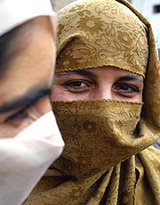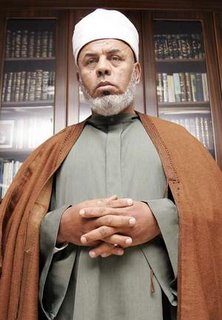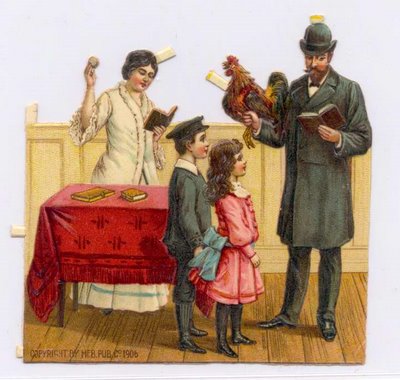

Two cartoons from Nicholson in The Australian relating to the Al-Hilali debacle.
My thoughts, ideas and opinions on things Jewish, Australian, Lubavitch and everything else...
 With regard to our friend (not!) Sheik Taj Aldin Al-Hilali which I spoke about here, The Australian has a number of articles on this topic.
With regard to our friend (not!) Sheik Taj Aldin Al-Hilali which I spoke about here, The Australian has a number of articles on this topic.
 Sheik Taj Aldin Alhilali has opened his big mouth again and demonstrated his true colours. In a much publicised speech he has defended Moslems who were sentenced for gang raping 4 women in 2000. In the much publicised Ramadan sermon to 500 of the faithful last month The Age reports:
Sheik Taj Aldin Alhilali has opened his big mouth again and demonstrated his true colours. In a much publicised speech he has defended Moslems who were sentenced for gang raping 4 women in 2000. In the much publicised Ramadan sermon to 500 of the faithful last month The Age reports:He said there were women who "sway suggestively" and wore make-up and inappropriate clothes, "and then you get a judge without mercy (rahma) and gives you 65 years".According to the report in The Age here, a statement was issued today by the Lebanese Muslim Association who said "The board is satisfied with the notion that certain statements made by the mufti was misinterpreted."
"If you take out uncovered meat and place it outside on the street, or in the garden or in the park, or in the backyard without a cover, and the cats come and eat it ... whose fault is it, the cats or the uncovered meat," the sheik asked.
"The uncovered meat is the problem."
"If she was in her room, in her home, in her hijib (head scarf), no problem would have occurred."



A choshever balaboss named IB came up to me in the break between Musaf and Mincha today and said he needed to tell me something that recently happened to him in Eretz Yisrael when he went to his grand-daughter's wedding.
The morning of the wedding he went to the Kossel with members of the wedding party. While there he put on Tephillin at the Chabad table and got all those with him to do so as well. Later that evening at the wedding he suddenly felt unwell and when they gave him some water to drink he couldn't swallow it and then the glass dropped from his hand. His daughter (mother of the kallah) is a doctor and she immediately told him that he was having a stroke. They rushed him to hospital where he was indeed diagnosed with a stroke and by that time he was totally paralyzed on one side and was unable to talk. They gave him various medications and hooked him up to all sorts of machines. Eventually he fell asleep. While asleep he dreamt that a Rabbi came to see him. He recognized from the pictures that he had seen that it was the Lubavitcher Rebbe. The Rebbe asked him if he had put on tephillin that day and he answered eagerly that he had put them on with the Rebbe's Chassidim at the kossel. The Rebbe asked him to show him - so he pulled up his sleeve and the marks from the straps were clearly there. The Rebbe's face lit up with a huge smile and he put his hand on the man's arm and said "Zeit gezunt" and then walked off. The balaboss woke up the next morning and to the astonishment of the doctors and his family he was able to move and talk without any problem whatsoever. The story happened two weeks ago and he was the picture of perfect health today in Shule. (I called over a number of our Lubavitcher yungerleit who daven in our Shule to verify the story directly from him in case anyone thought that the fast had caused me to hallucinate...).
There is no reason whatsoever for him to have made up a story like this and the look on his face when he told me the story and the tears in his eyes all added to the impression that this had been a very real experience for him...
A Gut Moed.
A record number of Jews gathered Monday at the Western Wall of the Temple Mount in Jerusalem's Old City for the traditional massive Birkat Kohanim, priestly blessings.
The ceremony has become a tradition ever since the liberation of the Temple Mount during the Six-Day War in 1967 and is seen as an observance of the Jewish obligation to make a pilgrimage to Jerusalem and the Holy Temple three times a year, on Pesach (Passover), Shavuot (Pentecost) and Sukkot (Tabernacles). During the weeklong Pesach and Sukkot holidays, the ceremony is held on the second of the Hol haMoed (intermediate) days.
Hundreds of kohanim, Jews who trace their lineage to Aaron, the first High Priest, stood closest to the Western Wall to take part in the special blessings. Attending the Western Wall prayers Monday were Chief Rabbis Shlomo Amar and Yonah Metzger, as well as Western Wall Rabbi Shmuel Rabinovitch. Rabbi Rabinovitch told Arutz-7 that Monday's priestly blessing marked the largest such gathering for prayers at the site since the first Sukkot after the Six Day War.
Police were forced to close the gates leading to the Western Wall Plaza due to its being filled to capacity by worshippers. "The blessing, however, reaches those stuck outside the plaza as well, obviously," Rabbi Rabinovitch said. He added that many of those packing the plaza were not outwardly observant. "Many secular Jews have adopted the custom of making a pilgrimage to the Western Wall on the holiday," he said.
